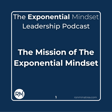
Leading Through Change Fatique
Change fatigue is real — and it’s not slowing down. Leaders everywhere are being asked to guide their teams through wave after wave of new initiatives, strategies, and reorganizations. But when exhaustion and skepticism set in, how do you keep trust and energy alive?
In this episode of The Exponential Mindset Leadership Podcast, Ron Minatrea shares three ways to lead through change fatigue: seek to understand the bigger picture, share honestly what you know (and what you don’t), and translate strategy into something your team can connect with. These simple moves will help you stay aligned, build credibility, and keep your team engaged — even when the changes keep coming.
📺 Watch this episode on YouTube: https://www.youtube.com/@RonMinatrea
🌐 Learn more at: https://www.ronminatrea.com
💼 Connect on LinkedIn: https://www.linkedin.com/in/ronminatrea



![The Audience Growth Engine [Full Framework] image](https://media.zencastr.com/cdn-cgi/image/width=112,quality=85/image-files/630c9f06819f8b3dba5fa460/46b84fd1-e856-4687-9aee-6b4a7e0bc7ff.png)




![The "Dream 100" Execution Plan [Google Sheet System] image](https://media.zencastr.com/cdn-cgi/image/width=112,quality=85/image-files/630c9f06819f8b3dba5fa460/fcd89374-76a4-4e58-a2e3-2bb7ddda4364.png)










